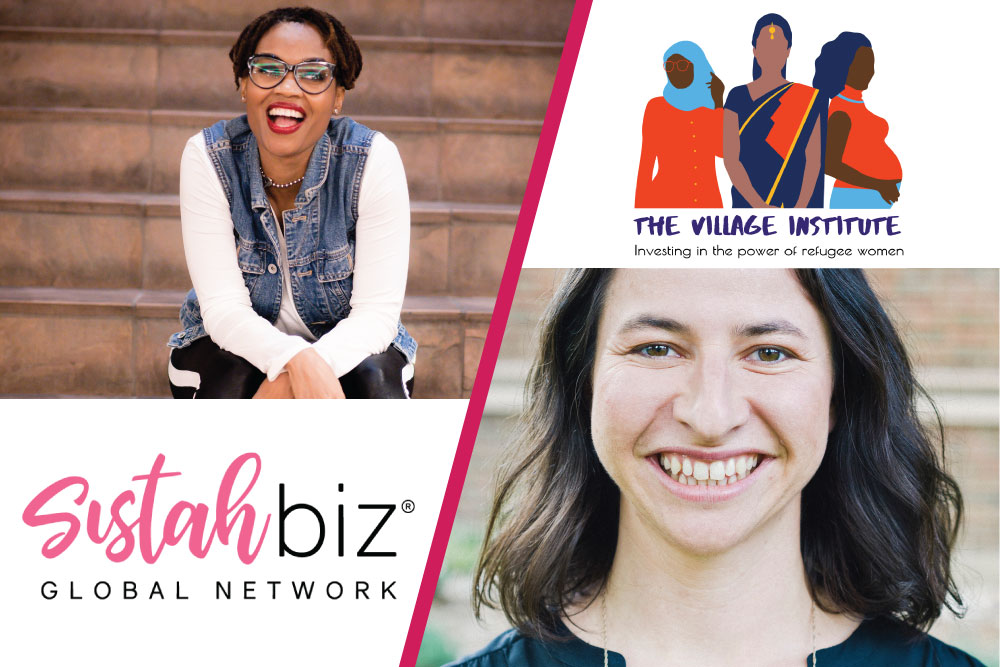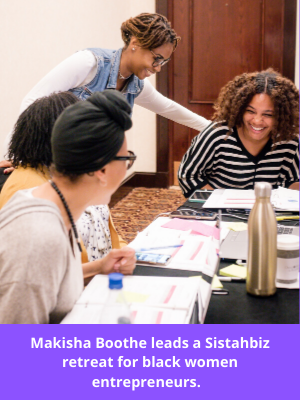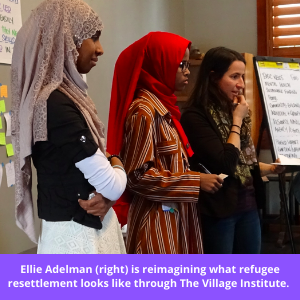
Groundbreaking Giving Circle Invests in Two Women Entrepreneurs
Sistahbiz and The Village Institute Elevate Opportunity for Black Women, Refugees
The Women’s Impact Investing Giving Circle (WIIGC) at The Women’s Foundation of Colorado directly expanded funding opportunities for women entrepreneurs when it selected two organizations for investment this month. Three years in the making, WIIGC was initiated to provide equitable funding opportunities for social ventures led by and benefitting diverse women, especially women who have historically had the most limited access to capital.
Laying the groundwork for a groundbreaking idea with Impact Finance Center
WFCO is the first community foundation in the country to offer this type of impact investing circle. The giving circle gives donors a new way to collectively maximize their philanthropic dollars while extending WFCO’s mission through direct investment. To ensure the launch was a success, WFCO partnered with Impact Finance Center.
Membership opened in 2019, with 37 women contributing to the fund as members to make a difference for women-led social ventures. With IFC donating its services to provide giving circle members with education in governance, social ventures, due diligence, and deal creation, WIIGC membership includes a hands-on learning environment for members to jointly determine how to deploy their pooled resources.
Each member contributes a minimum of $2,000 per investment cycle. Social ventures (projects, nonprofits, for-profits, start-ups, and ideas) led by and benefitting women go through a thorough application process. Due diligence and venture selection is led by WIIGC members with the help of WFCO and IFC. Members do not earn income or receive return of principal from this fund. Any principal returned or income earned is returned to WIIGC for future investment.
Why invest in women entrepreneurs?
According to an American Express study, there’s an estimated 13 million women-owned businesses in the U.S. (approximately 41 percent) , employing 9.4 million workers and generating $1.9 trillion in revenue. Yet, only 4 percent of the total dollar value of all small business loans goes to women entrepreneurs, with women of color receiving less than 1 percent of total funding.
Last year, a Forbes article highlighted a set of statistics outlining the business case for investing in women-led startups. Included in the list was data indicating private tech companies led by women achieve 35 percent higher return on investment than those run by men. Additionally, the article cited a study of over 350 startups that showed businesses founded by women deliver higher revenue—more than 2 times as much per dollar invested—than those founded by men.
While the math adds up, women founders continue to face a myriad of barriers due to gender bias. For starters, they don’t have the same access to capital as men do. According to a National Women’s Business Council report, data indicates that female founders received only 2.2 percent or just $2.9 billion of the total $130 billion of 2018 venture capital dollars. And since 2009, black women founders have raised only .0006 percent of all venture capital dollars.
“The giving circle is one example of how WFCO is catalyzing community to advance and accelerate opportunity for Colorado women of every background and identity,” said Lauren Y. Casteel, president and CEO of The Women’s Foundation. “In addition to our research, policy, and grantmaking, our impact investing helps to dismantle barriers to entry for women entrepreneurs.”
WIIGC selects two social ventures impacting historically underserved communities
From 116 applications submitted, two projects emerged as the top choices for investment at $40,000 each. WIIGC member Dianne Myles shared what stood out about the two organizations, Sistahbiz and The Village Institute.
As a Black woman who works within both the worlds of entrepreneurship and philanthropy, it is critical that my voice is at the table – Dianne Myles, WIIGC member
“As a Black woman who works within both the worlds of entrepreneurship and philanthropy, it is critical that my voice is at the table,” said Myles. “The selected organizations are creating innovative ways to positively impact historically underserved communities – created by and for women – and the funding decisions should not be made without diverse voices who can deeply understand their impact. WIIGC and The Women’s Foundation have done a great job of creating a space and place for women to receive funding.”
Makisha Boothe: Sistahbiz Global Network
 After years of working in politics, policy, and community engagement activities to eradicate systemic injustice, Makisha Boothe decided to continue to pursue these goals from a different perspective—using wealth-building as a way to dismantle systems of injustice, impact lives, and put an end to the generational cycles of poverty that often run through Black communities. Her efforts resulted in Sistahbiz Global Network, a nonprofit organization dedicated to providing Black women entrepreneurs with free and low-cost coaching, training, technical assistance, and community.
After years of working in politics, policy, and community engagement activities to eradicate systemic injustice, Makisha Boothe decided to continue to pursue these goals from a different perspective—using wealth-building as a way to dismantle systems of injustice, impact lives, and put an end to the generational cycles of poverty that often run through Black communities. Her efforts resulted in Sistahbiz Global Network, a nonprofit organization dedicated to providing Black women entrepreneurs with free and low-cost coaching, training, technical assistance, and community.
Sistahbiz is helping to increase the number of Black women entrepreneurs who own profitable, scalable, sellable businesses; helping ensure their business success; while closing racial and gender equity gaps in entrepreneurship. While women as a whole face many barriers when it comes to entrepreneurship, there are a host of additional challenges faced by Black women.
According to research by American Express, Black women are starting businesses at the fastest clip of any racial group, growing by 164 percent. Despite this, they are shut out when it comes to access to capital, training, coaching, and revenue generation. American Express also reported that in 2018, the revenue gap between Black women business owners and all women business owners was $24,700 vs. $143,100, respectively. Black women also tend to stick to low barrier to entry industries such as child care and hair salons due to lack of access to financial and social capital and other resources required for growth or scale, including mentorship.
Black women business owners tend to be younger, and many have left the traditional job market due to roadblocks to advancement. 64 percent work less than 39 hours a week on their businesses, typically because it’s a side business. A common reason Black women opt to start side businesses is that many are underpaid and need extra income. Additionally, Black women often report being pushed out or mistreated in predominantly white organizations and corporate environments.
Through Sistahbiz, Black female entrepreneurs come together from all walks of life, with a common goal —to receive the business building tools and resources they can’t get anywhere else.
They also have access to a community that understands, supports, and works together to create shared success. Together they are becoming stronger entrepreneurs with bigger visions for their companies, with Sistahbiz helping them access the resources they need to realize those visions.
Sistahbiz is a catalyst for change, providing a ripple effect throughout the community. While today’s issues are larger than helping small businesses, building wealth can be a long-term sustainable strategy for breaking down systems of injustice.
“The past few weeks have been difficult ones,” said Boothe. “This WFCO investment in our organization was encouraging during this very tough time. The organization’s support of our vision and our long-term impact means a lot,” she continued. “And that impact is to economically empower the community through an increase in scalable, sellable businesses that hire from within the community, invest back into the community, contribute to the closure of the community’s wealth gap, and ultimately contribute to breaking down systems of injustice.”
Ellie Adelman: The Village Institute
 Over and over, as a case manager and design thinking consultant with the African Community Center, one of Colorado’s primary resettlement agencies, Ellie watched as single-mother-led refugee families struggled to make ends meet while creating new lives for themselves and their children in a new country, often while learning to speak a new language.
Over and over, as a case manager and design thinking consultant with the African Community Center, one of Colorado’s primary resettlement agencies, Ellie watched as single-mother-led refugee families struggled to make ends meet while creating new lives for themselves and their children in a new country, often while learning to speak a new language.
At the same time, she thought about her own background, a Jewish family that fled Eastern Europe who left their history and family stories behind as they started a new life in the U.S. These were the sparks that ignited The Village Institute, a social enterprise that invests in the power of refugee women.
This holistic live/learn/work center model for single-mother-led refugee families brings language learning, child care, job readiness, financial capability training, and mental health services all under one roof. The building doubles as multicultural child care center and refugee entrepreneurship incubator, with the vision of becoming financially sustainable and empowerment-driven.
After fleeing their home countries due to conflict, persecution, or disaster, their lives and livelihoods shattered, many of the refugees settled across the U.S. find themselves struggling to find jobs and pay for everyday expenses including housing, transportation and food. According to a Migration Policy Institute report, the median income for refugee families within their first 5 years is 42 percent of that of U.S. born families.
Refugee women from many countries are employed at lower rates than their U.S.-born counterparts, often meaning lower overall household income. These numbers are only amplified for courageous single mothers, who have navigated the resettlement system, only to be met with a variety of challenges to building wealth, community, and creating a better life for themselves and their children.
The Village Institute reimagines refugee resettlement for these strong, resilient, extraordinary single mothers and their children. Through a continuum of services approach, families access transitional skills and services to adapt to a new life in the U.S. These services include affordable housing, language learning, mental health care, educational opportunities, and financial literacy, as well as using existing skills to build pathways to wealth and long-term empowerment. Culture is celebrated and everything from food, stories, dress and dance are shared, enabling women and their children to begin to build the social capital that comes from truly belonging to a safe, supportive community.
“As a woman running a social enterprise that promotes female empowerment, it’s been hard to find a place – and funding – in the male-dominated entrepreneurship and business development world,” said Adelman. “I am honored and grateful to be chosen by a group of women, to receive funding that helps lift up other women as they build a bright new future for their families.”
Gender-Lens investing initiatives at The Women’s Foundation of Colorado
WIIGC is just one part of a broader gender-lens investment strategy at The Women’s Foundation of Colorado. The Women’s Forum of Colorado, a donor-advised fund held at WFCO, recently created the Colorado Women’s Main Street Loan Program with Colorado Lending Source. The loan program is a character-based financing option for entrepreneurs that are unable to secure conventional loans to start or grow their business. The Colorado Women’s Main Street Character Loan Fund will provide capital exclusively to women entrepreneurs in Colorado.
In April, WFCO also provided Sistahbiz, The Village Institute, and seven additional women-led social ventures with $45,000 in grants from the Women and Families of Colorado Relief Fund (WFCO Relief Fund) to help mitigate the economic fallout of COVID-19.
The next investment cycle of the Women’s Impact Investing Giving Circle will begin in late 2020. For more information, contact our director of development, Colleen LaFontaine, at colleenl@wfco.org.

